Camping in Six Mile Lake Provincial Park and Canoeing on Various Lakes in Muskoka, Ontario, June 18-24, 2011
My first visit in Six Mile Lake Provincial Park probably took place in the early 1990s, almost 20 years ago. The park, located just north of Port Severn, off highway 400 (although in the 1990s it was still a narrow, two-lane highway 69), is easy to reach from Toronto (less than a 1.5 hour drive) and offers a lot of very good campsites and plenty of canoeing and fishing opportunities. I have visited it numerous times, often staying for two nights only while fishing on nearby Georgian Bay. Due to its proximity to Toronto, the park is usually quite full in the summer; that's why I always try to camp there either in May/June or September/November: in 2010 we camped there twice and enjoyed our stay very much, so we booked a very nice site (where I had camped in 2009) and arrived on June 18, 2011.
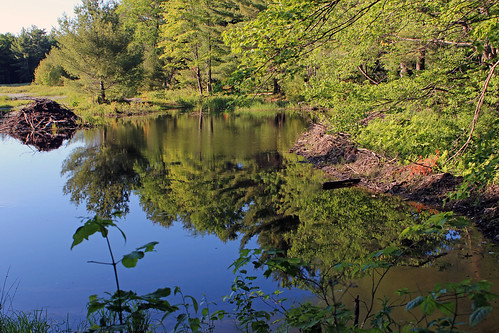
I knew it was an excellent site: relatively secluded, spacious, facing a marshy pond—but this year we noticed something new: an imposing beaver lodge just a stone's throw away! The beavers also build a dam, so the water level has gone slightly up since my last visit there. I expected to see beavers on a daily basis, but for the first few days neither did I see nor hear one and started to suspect that the beavers somehow were gone... but one day we saw a beaver, quietly swimming in the pond, then diving, then emerging again some other place. We soon set up the tent and drove to the town of Port Severn. Last year the bridge over the locks was being repaired and we had to use highway 400 to get to the other side of the town; unfortunately, the bridge was still being under construction. Port Severn has a small LCBO store, post office, a few small stores and several marinas. After all, here ends (or begins, depending on the direction of travel) the Trent-Severn Waterway, a canal system allowing boats to get from Lake Ontario to Georgian Bay. After purchasing cold beer we drove back to the campsite. In the evening we embarked on a short hike along the Living Edge Trail
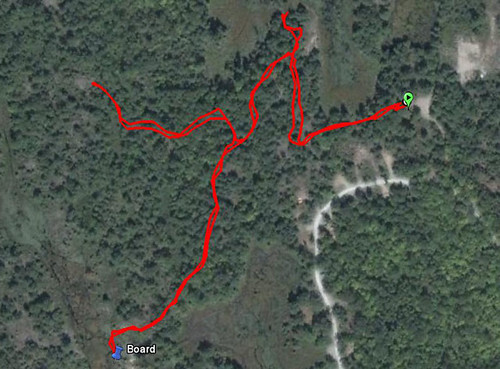
It is a beautiful trail, meandering through marshes, crisscrossing a snowmobile trail and then leading on the other side (north) of the pond where our campsite was located. After reaching the boardwalk, we spent some time observing playful water bugs, 'dancing' on the surface of the water. Once the darkness had fallen, we were sitting around the campfire, being serenaded by a choir of tree frogs. Although we closely examined the trees and shone our flashlights at them, we never managed to see even one frog! Since it was Saturday, we heard laughter and loud conversation coming from various campsites, but since the adjacent campsites were not occupied, we enjoyed plenty of privacy.

Just before we were about to go to bed, we saw a raccoon who took a look at us and went away, no doubt to visit other campsites. He would visit our campsite every night; despite our precautions, he managed to steal our newly-purchased fresh corn.
On Sunday most of the campers left the park and we enjoyed almost as much privacy as when camping on the French River. The weather was perfect for canoeing and we were ready to hit the water—after all, we were in Muskoka, the prime cottage country, containing about 1,600 lakes (Lake Muskoka, Lake Rosseau and Lake Joseph being the biggest) and thousands of cottages, many of them mansion-like summer estates, with impressive boathouses, separate guest/servant quarters, docked boats and even float planes. Over 2 million visitors annually come here to enjoy this unique scenery and a myriad of activities on the water or land. In fact, National Geographic just picked 10 Best Trips of Summer 2011 and Muskoka Cottage Country was voted number one trip! No wonder—after all, many top business people or celebrities (just to mention Goldie Hawn, Steven Spielberg, Tom Hanks, Mike Weir, Martin Short, Kurt Russel, Cindy Crawford) have their retreats there. Unfortunately, this area does not have any centrally located provincial parks or other accessible camping grounds, so Six Mile Lake Park is the perfect jumping board to experience Muskoka.
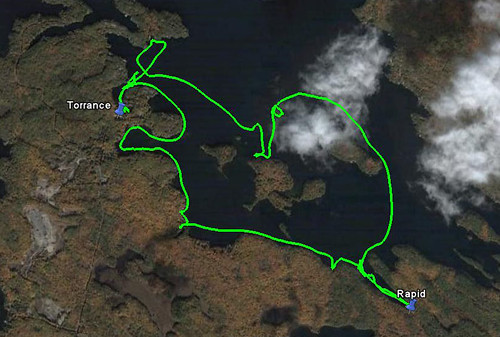
We took a look at the map and decided to drive somewhere past Bala. The route took us through highway 38, a Native Reserve (Mohawk Wahta), dotted with signs advertising 'cheap smokes'--indeed, some of them cost much less than 50% of the regular price. Whereas such sales have been going to for a long time, according to a recent newspaper article, the government is going to crack down on those who buy and transport such cigarettes. Once we passed a very lovely and popular town of Bala, we continued on road 169 and reached a cozy marina in Torrance, on East Bay of Lake Muskoka. We chatted a little with a young marina employee, paid the $5.00 parking fee and soon were on our way towards the open water. Slowly paddling along the shores, we saw many cottages, some very imposing, with very elaborate boathouses and separate guest houses. We ended up in a blind bay with rocky rapids; surprisingly there were no cottages on either shore and we thought it might be crown land, but later were told it was part of an 'unorganized' provincial park called Hardy Lake. While in the bay, my GPS topographical map just disappeared and I could not get it working again, so for the remainder of the trip I only had the base map (which was pretty useless) and had to rely on regular maps, which were not very good for canoeing. The sun was gradually setting as we paddled near Morris Island and Crane Island. When we were approaching the next small island (Loon Island), we heard a lot of ruckus and saw plenty of various birds flying all over the island. Apparently the whole island was one big rookery (a colony of breeding birds): we saw at least 5 nests on tree tops with majestic blue herons, plenty of cormorants' nests and some see gull chicks with their parents on the ground. The birds were flying in and out, producing tons of noise, although I do not think it had anything to do with our presence—we circled the island and paddled away, yet hear their loud calls for quite a while.
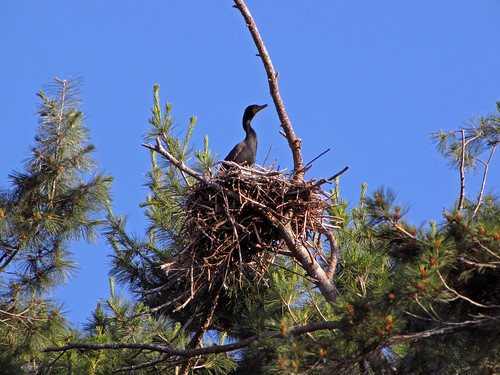
It was getting dark when we were back at the marina. Attacked by mosquitoes, we put the canoe on the car, killed about a dozen or so of those pesky insects that had got inside the car and drove back to the park. Even though we did not find mosquitoes to be a big problem at the park, they were extremely active near the water between 9 and 10:00 in the evening—exactly the time we were finishing our trips and transferring our stuff to the car! On the way back to the park I saw a few deer standing along the road—I tried to drive as slow as possible to be able to bring the car to a stop in case a deer or other mammal decided to cross the road in front of my car.
On Monday, June 20, 2011, we were awaken at 6:00 am by very noisy gulls who were probably fighting over something at our campsite—however, we did not leave any food (even if we did, it must have been devoured earlier by our friendly raccoon). We slept till noon, but since it was too hot and humid for canoeing, we did not mind the extra rest. Later that day we decided to drive to Gravenhurst (birthplace of Norman Bethune, a Canadian communist who went to China in the 1930s.). Mao Zedong wrote an essay “In Memory of Norman Bethune” in December, 1939, praising this Canadian doctor. ["The distinguished surgeon Norman Bethune (...) came to China in the spring of 1938. Imbued with ardent internationalism and the great communist spirit, he served the army and the people of the Liberated Areas for nearly two years. He contracted blood poisoning while operating on wounded soldiers (...) and died a martyr at his post. What kind of spirit is this that makes a foreigner selflessly adopt the cause of the Chinese people's liberation as his own? It is the spirit of internationalism, the spirit of communism, from which every Chinese Communist must learn. (...) We must learn the spirit of absolute selflessness from him.”]. Indeed, every Chinese Communist at least learned ABOUT him, as the the essay became an integral part of the famous “Red Book” and eventually Bethune became a hero figure in China.
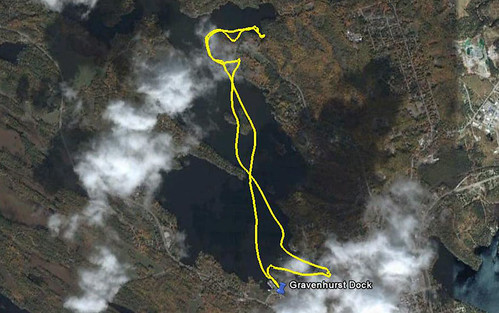
Gravenhurst is one of the three major towns in Muskoka (Huntsville and Bracebridge being the other two). There was a big parking lot along the water and a public boat ramp... as well as a big hotel, condominium and plenty of other new buildings. I remember coming there about 15 years ago, stopping in the parking lot and going fishing in an inflatable boat—yet at that time there were hardly any other buildings around. It has changed so much since then! And when I look at my topographical map, I can see that there was a rail track leading to the dock exactly where we put it the canoe. Needless to say, I did not see any tracks, only luxurious condos and hotel...
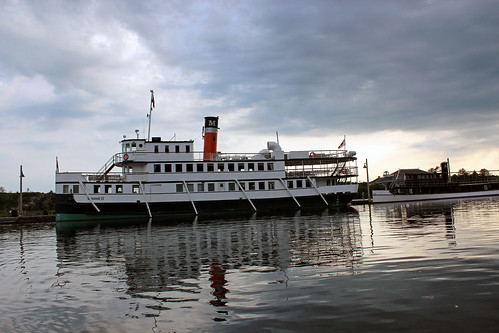
First we paddled to the right, where “The RMS Segwun”, the oldest operating vessel in North America, built in 1887, was docked. Then we paddled north, passing by Graevette Island (during my last fishing expedition it was near this island, while using a live bait and big bobber, suddenly I saw the bobber disappear under the water and my line becoming very tight... before I could react, the line broke and I lost what could have been the biggest fish of my life... well... the one that gets away is always the biggest fish anyway!) and finally saw a hospital-like building, visibly abandoned, yet maintained to some degree, with signs warning us to stay away. We docked at a boat ramp and Catherine, being very adventurous and not very law-abiding, decided to go ashore and explore the area. Indeed, it used to be the Muskoka Sanatorium, supposedly the first Tuberculosis Sanatorium in Canada, which later became a mental hospital. It has been unused and abandoned for some time; for inexplicable reasons, the government (or whoever owns it) has not sold it—yet I can only imagine how much money this prime property could generate! We paddled around the the property and then slowly headed back.
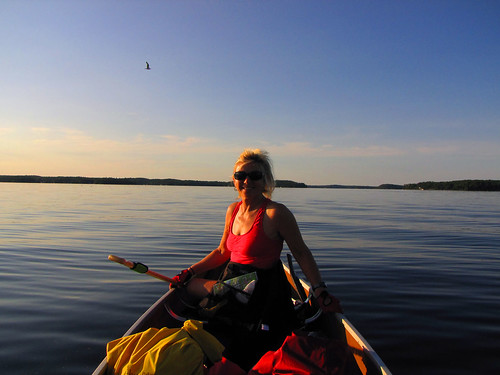
Since it was getting dark, we attached headlights to be visible to passing motorboats (somehow canoes are not required to have any attached lights like other boats are, and a regular flashlight is totally sufficient). Whereas the headlights did convey our presence to other boaters so that they could avoid us, it also attracted the attention of mosquitoes—they, however, did not avoid us!
Tuesday, June 21, was a little cloudy, the forecast mentioned a chance of rain or thunderstorm, yet we still went paddling—this time drove to Port Severn and launched our canoe from the marina on Little Lake, just north of highway 400.
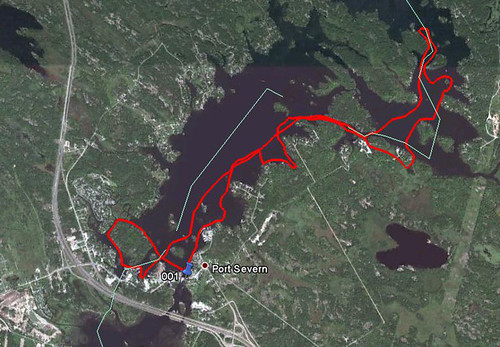
As we were starting our trip, it almost rained, but the dark clouds were blown away and we did not have to don our rain gear. We paddled to Gloucester Pool, passing a lot of islands and impressive cottages along the way. We stopped at a marina near Piklington Island, bought some chips and chatted with the owner for a while, a very nice man who had bought this place four years ago. We found out that Piklingon Island was sold some time ago; a developer constructed a bridge, built four mansion-like cottages and now is selling them for about 1.3 million dollars. We paddled under the bridge, passed a marina (Narrows Marina), then slowly moved into a very grassy area, passed another small bridge leading to Darling Island and eventually turned back past Hawkins Island in Gloucester Pool. As always, I was trolling a lure behind the canoe, yet did not catch anything. I talked to other fishermen and was told fishing was not very good so far. At least I was in a good company! When we reached our put in point, the sun had already set, but it was summer solstice and the sky was a brilliant pink/orange. We paddled close to the locks, around Yellowhead Island and eventually to the marina, where we were greeted by hordes of mosquitoes—their swarms were all over us and we literally raced to put the canoe on the car and throw our staff inside the car. Catherine had had the foresight to pack her bug netting in her dry sac so suffered very little—as for me, I find mosquitoes annoying, yet put up with them without a bug netting, which I find rather restricting. Once we were safely inside the car, we closed the doors and spent at least 10 minutes exterminating well over 30 of those irritating insects.
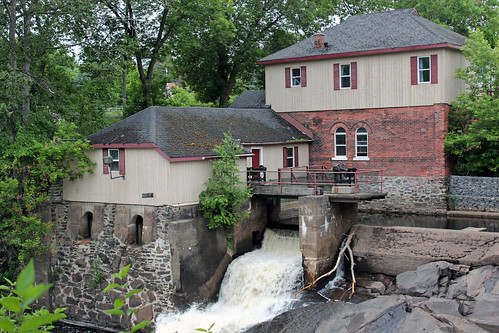
As we expected, it rained overnight, so the next day (Wednesday) we drove to Bracebridge, parking just below the Bracebridge Falls and old power plant (which was being renovated). The big dock was used for a cruise ship at one time. We walked along the main street (most stores were closed, however), saw an old, historical power station and spoke for a while to a gentleman walking his two dogs. Since the weather was somehow precarious and it was late, we did not put the canoe on the water, but made a promise to come to Bracebridge in the future to paddle on the Muskoka River. It was raining while we were driving to the park—I was really glad we had set up the big, white tarp over our campsite and the fire pit, as it allowed us to enjoy the campfire when it was raining.
On Thursday, June 23, due to the rainy weather, we spent most of the time sitting on our campsite; at one point it started pouring cats and dogs, a huge paddle formed just next to the tent, but it did not do much damage to our belongings inside.
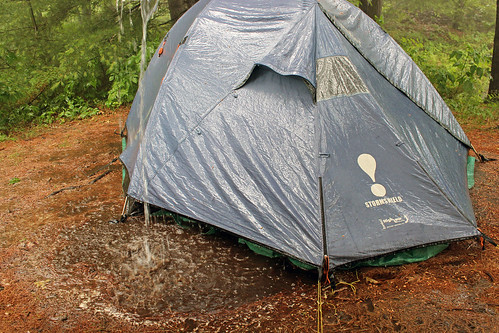
Later the weather somehow stabilized and we decided to go for a paddle on Six Mile Lake. We drove to the park's dock, parked the canoe and paddled past Maud Island; it was quite late when we turned back and at one point we were quite confused which direction to paddle.
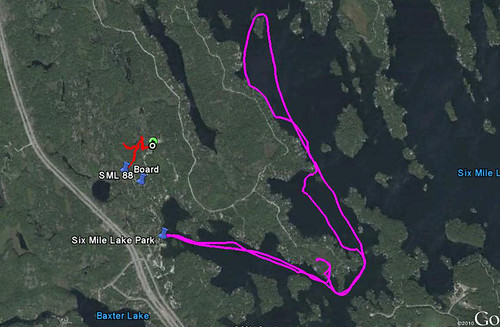
Even though my GPS did not show the topographical map, it still plotted our trip and helped me greatly to show us the right route—yet I realized its light did not work! Soon it became totally dark, our headlights were on, attracting mosquitoes, and we hardly saw anything, relying mostly on the GPS and occasional cottage lights—not too many cottages were occupied this time of the year (and week), yet more and more people planted those new LED garden lights, which use to sun to charge their batteries, so even if we saw a relatively well-lit cottage, it did not mean anyone was there! Finally we approached the shore, managed to find the dock and in no time drove to our campsite to enjoy our last campfire of this trip, as we were leaving the next day.
We were planning to get up earlier, as it was Friday (June 24) and we expected campers to arrive in the park, but it was raining in the morning, so we kept sleeping. When we got up, it was noon, we had breakfast and before we even started packing, a car drove by, stopped by our campsite and the guy said he was supposed to stay here... well, he gave us a big push and we were packed and ready to go in about 30 minutes. We headed on roads 34 and 17 to Severn Falls; while crossing the rail track, we saw a rather deformed aluminium shack next to the tracks—a result of a cargo train derailment that had taken place a few months ago in the winter. Just meters from that place there is a marina, restaurant, cottages and a small store; we had our Thanksgiving Day turkey dinner at that restaurant in October, 2010 after paddling on the Severn River towards the east. This time we paddled on the river towards Georgian Bay.
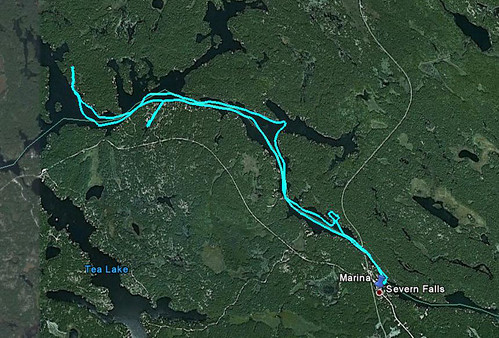
After passing the rail bridge, we moved westward, exploring small bays and inlets and looking at some impressive cottages along the shore. We entered Woods Bay, but eventually paddled on and ended up in a blind bay near Copp Channel where we saw plenty of insect eating (carnivorous) plants probably known as sun-dew plants. We turned back and started paddling back to the marine; on our way we went into a blind bay near Lost Channel Landing and arrived at the Severn Falls marina past 9:00 pm. On our way home we stopped in Barrie and went to Tim Horton's for a light snack of bun, coffee and chilly, but since Catherine was still hungry, I stopped at McDonald's on highway 400 & 89 where she fully satiated her hunger and after midnight arrived home.
Blog in Polish/Po Polsku: http://ontario-nature-polish.blogspot.com/2011/07/six-mile-lake-park-2011.html
No comments:
Post a Comment